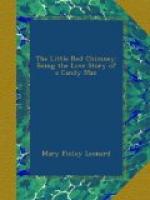The thought thrilled him. He rose and walked on, back to the pavilion, where he paused again to rest. There on the step lay the shabby book with the funny name and the small oval bit cut from the fly leaf, beneath which was the Candy Man’s name, Robert Deane Reynolds.
CHAPTER FOURTEEN
Shows how Mrs. Gerrard Pennington, unhappy and distraught, beseeches Uncle Bob to help her save Margaret Elisabeth; also how Mr. Gerrard Pennington comes to the rescue, and how in the end his wife submits gracefully to the inevitable, which is not so bad after all.
When Mrs. Gerrard Pennington was shown into the room of the Little Red Chimney, there was nobody there. A chilly wind outside, which dashed the rain against the windows, only served to call attention to the pleasantness within. It was indeed an aggressively cheerful room, entirely out of keeping with Mrs. Pennington’s mood. The open piano, the row of thrifty ferns on the window-sill, the new novel on the table with a foreign letter between its leaves, and the work basket beside it—which, by the way, was of sweet grass—all sang the same song to the accompaniment of the fire’s quiet crackle.
The burden of the song was Margaret Elizabeth. You saw her sitting bolt upright on the sofa, being very intense about something, or lost in thought, elbows on knees, on the ottoman beside the hearth, or occupied with that bit of embroidery, her curling lashes almost on her cheek. Oh, Margaret Elizabeth, how could you? How could you?
Mrs. Pennington, pacing uneasily back and forth, glanced at the music on the piano rack.
“Oh, stay at home, my heart, and
rest,
Home-keeping hearts are happiest,”
it admonished her. In this disarming atmosphere she began to feel herself the victim of some wretched dream. Yet here in her bag was Margaret Elizabeth’s note, found awaiting her on her return from Chicago an hour ago.
In it her niece apologised contritely for the inexcusable manner in which she had spoken, and continued: “It makes me unhappy, dearest Aunt Eleanor, to think of disappointing you, for you have been the kindest aunt in the world, but I have discovered in the last few days what I ought to have known all along, that I cannot marry Mr. McAllister. The reason is there is some one else. He is neither rich nor of distinguished family, but there are things that count for more, at least to me. I shall see you very soon, and explain more fully. In the meantime think kindly, if you can, of your niece,
MARGARET ELIZABETH.”
[Illustration: MRS. GERRARD PENNINGTON]
This as it stood was bad enough, wrecking her dearest hopes at the moment when they had seemed most secure; but taken in connection with a story related in artless innocence by her travelling companion of yesterday, Teddy Brown, to use one of that gentleman’s cherished phrases, it spelled tragedy.




